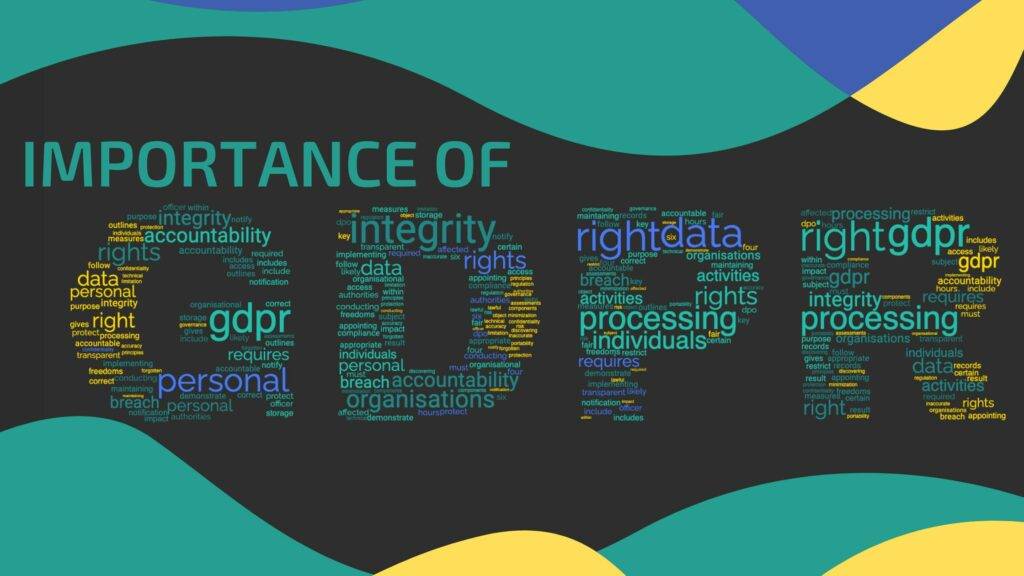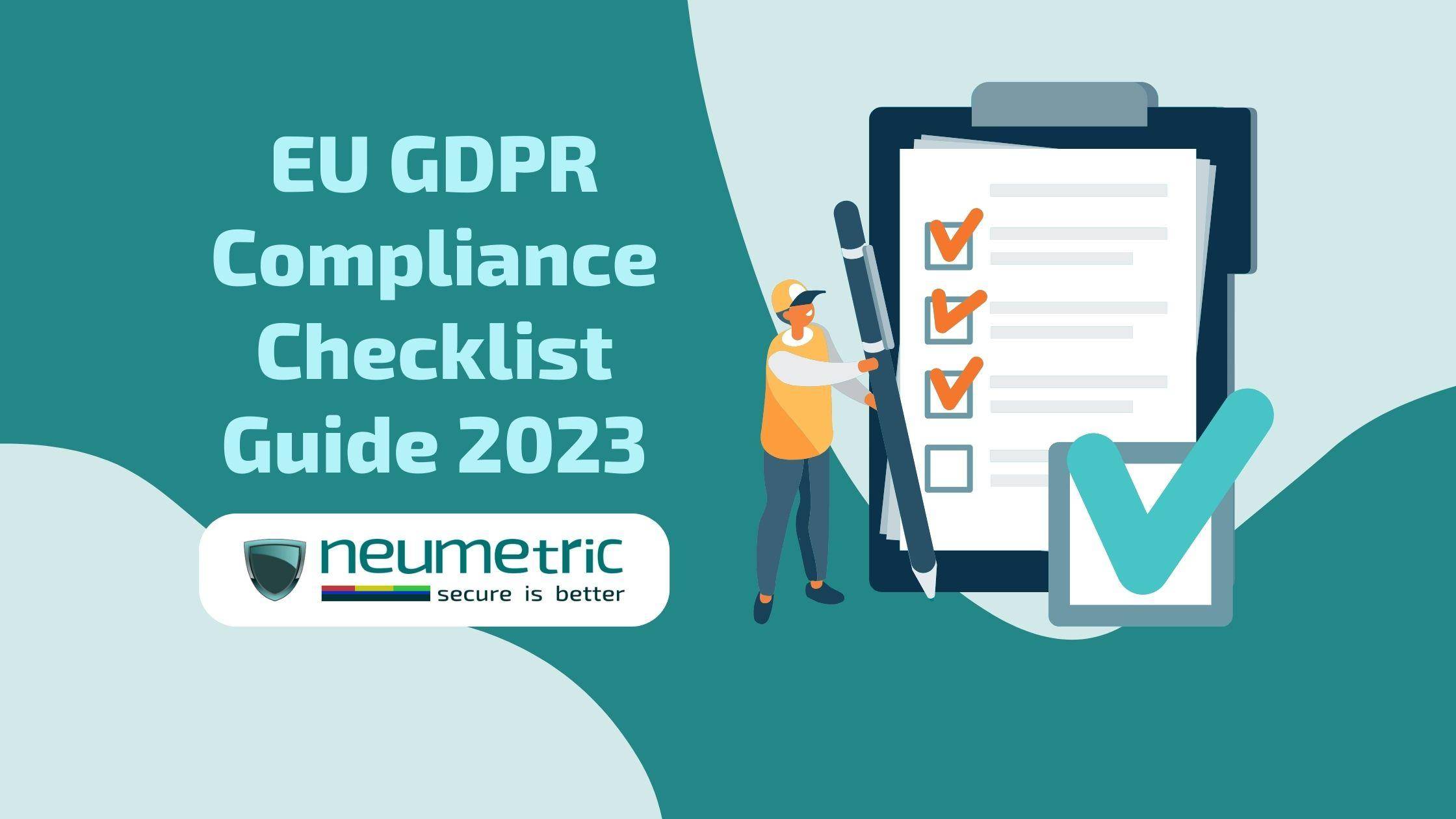Table of Contents
ToggleWhat is GDPR Compliance?
The General Data Protection Regulation [GDPR] is a Regulation by the European Union [EU] that has been put in place to protect the personal data of all EU citizens. It is a comprehensive Data Protection Law that came into effect on Fri, 25-May-2018, in the European Union [EU] & the European Economic Area [EEA]. The purpose of GDPR Compliance is to give individuals more control over their Personal Data & how it’s used.
It’s a new set of rules that aims to protect data & privacy, as well as make it easier for an individual to control how Organisations collect, store & use a User’s personal information. The GDPR Compliance checklist outlined in this article will help you get one step closer to achieving GDPR Compliance.
Why is the GDPR important?
The GDPR has been designed so that Organisations can’t abuse the power they have over individuals’ personal data by collecting too much information about them without their consent or disclosing this information without reason. The law also gives people more control over their own personal data by allowing them to request access to what companies know about them or even delete it altogether if they choose not to share any details with third parties like Google Analytics (which tracks web traffic).
In addition, businesses must tell individuals what security measures have been taken when storing sensitive info such as Names, Addresses, Marital Status, Age, etc. to ensure that hackers aren’t able to access private information without permission!
The GDPR has four key components, which are:
- Data processing principles: The GDPR outlines six Data Processing Principles that Organisations must follow when processing personal data. These principles are
- Lawful, fair, & transparent processing
- Purpose limitation
- Data minimization
- Accuracy
- Storage limitation
- Integrity & confidentiality.
- Data subject rights: The GDPR gives individuals certain rights over their personal data which include the right to access their data, the right to correct inaccurate data, the right to be forgotten, the right to restrict processing, the right to data portability, & the right to object to processing.
- Data breach notification: The GDPR requires Organisations to notify data protection authorities & affected individuals within 72 hours of discovering a personal data breach that is likely to result in a risk to the rights & freedoms of individuals.
- Accountability & governance: The GDPR requires Organisations to be accountable for their data processing activities & to demonstrate compliance with the Regulation. This includes implementing appropriate technical & Organisational measures to protect personal data, conducting data protection impact assessments, appointing a Data Protection Officer [DPO] where required, & maintaining records of processing activities.

Why do you need to be GDPR Compliant
Organisations that collect, process, or store personal data of individuals in the European Union [EU] & the European Economic Area [EEA] need to be GDPR Compliant to ensure they are processing personal data in a lawful, fair, & transparent manner, & to avoid fines & penalties for non-compliance.
By complying with the GDPR, Organisations can demonstrate to their customers & stakeholders that they take data protection seriously, & that they are committed to protecting personal data. GDPR Compliance can also help Organisations avoid the significant fines & penalties that can be imposed for non-compliance, which can amount to up to 4% of an Organisation’s annual global turnover or €20 million, whichever is greater. Now that you know why you should become GDPR Compliant, let us look at the GDPR Compliance checklist that will help you achieve compliance.
GDPR Compliance Checklist
The GDPR Compliance checklist is a list of steps you can take to ensure that your business is compliant with the Regulations & avoid any potential fines. Below are some of the key areas that we recommend you focus on:-
1. Acceptable Use Policy
An Acceptable Use Policy [AUP] (also known as Acceptable Usage Policy) is a set of rules & regulations that govern how an Organisation will use the information it collects from its customers. The AUP should be available on your website, in an email signature & on any other digital channel you use to communicate with customers. The goal of this document is to inform users about what they can expect when they interact with your Company or Organisation online.
An AUP should include:
- What constitutes unacceptable behaviour? What are some examples?
- How do we define personal data? When does it become personal data?
- Who has access to personal data within our Organisation? Why do these people need access?
2. Privacy Notice
A privacy notice is a document that explains how you collect, use & share personal data. It also gives individuals the right to access their personal information & ask for it to be changed or deleted.
A good privacy notice should include:
- A clear description of the kind of information you collect about people who visit your site (for example, Name, Address, Email Address). You should also explain why you need this information; for example if it’s for marketing purposes only then say so!
- How long will you keep hold of this data? Are there any circumstances when it may be deleted earlier than expected? If so then state this clearly in bold text at the top as well as explaining why such action might occur (e.g., “If we don’t hear from our customers within 6 months then we’ll assume they no longer wish us to contact them further”).
3. Data Protection Impact Assessment [DPIA]
A Data Protection Impact Assessment [DPIA] is a Report that helps you identify the potential impacts of your processing activities on individuals’ rights & freedoms. It’s an essential part of GDPR Compliance, but it isn’t mandatory unless you plan to use new technologies or processes that could pose risks to individual privacy.
The DPIA process involves three steps: identifying the risks associated with your processing activities; determining whether those risks are justified in light of your legitimate interests; & developing appropriate safeguards for reducing any identified vulnerabilities. When done right, this process will help ensure your Organisation doesn’t accidentally violate anyone’s rights under the GDPR or cause harm by exposing sensitive information online or otherwise mishandling data in any way.
4. Data Protection Officer [DPO]
The Data Protection Officer [DPO] is responsible for ensuring that your Company complies with the GDPR. The DPO must be a named employee within your Company & must be independent from other employees. You can also hire an external consultant to act as your DPO if this makes sense for your business.
The main tasks of a data protection officer include:
- Monitoring compliance with GDPR Regulations;
- Assessing risk to personal data security;
- Conducting audits on internal processes related to personal data;
- Developing policies & procedures around how you collect, store, use, share & destroy personal information;
The requirements for what must be included in these policies will vary depending on what kind of Organisation you have–for example if you’re an online retailer then there are some specific things which apply only when dealing with customers’ credit card details whereas if someone works in healthcare then those same rules won’t apply because there isn’t any such thing as “credit” when it comes down to medical histories being shared between doctors!
5. Record-Keeping Procedures
Having proper record keeping procedures is also an essential part of the GDPR Compliance checklist as you must keep records of your data processing activities. These can include:
- Your Company’s Name, Address & Contact details,
- The purpose for which you are collecting personal data & how long it will be stored for,
- Any third parties with whom the personal data will be shared or transferred (for example if another Company helps manage your email marketing campaigns).
6. Training & Awareness
Training & awareness are key components to your GDPR Compliance strategy. Training your employees on how to handle personal data is an essential part of the process, as well as making sure they understand why it’s important for them to do so.
7. Risk Management & Governance Structure
The GDPR Compliance checklist also includes having a Risk Management & Governance Structure in place. In order to be compliant with the GDPR, you should have a Risk Management strategy in place. This involves identifying all potential risks that could affect your Company & its data, developing plans to mitigate those risks, & then implementing those plans.
In addition to this general approach to Risk Management (which applies across all industries), there are specific steps you can take as well such as defining roles & responsibilities within your Organisation so that everyone knows who is responsible for what tasks related to Data Protection Compliance.
How to be GDPR Compliant
To become GDPR Compliant, Organisations need to take the following steps along with the steps mentioned above in the GDPR Compliance checklist:
- Understand the GDPR: The first step to becoming GDPR Compliant is to understand the Regulation & its requirements. This involves familiarising yourself with the GDPR’s key principles, such as the lawful, fair, & transparent processing of personal data, & the rights of individuals over their personal data.
- Conduct a data inventory check: Organisations need to conduct a data inventory check to identify the personal data they collect, process, & store, including the categories of personal data, the purposes of processing, & the types of individuals whose data is being processed.
- Conduct a privacy impact assessment [PIA]: Organisations should conduct a Privacy Impact Assessment to identify the risks associated with processing personal data & to put in place measures to mitigate those risks. This involves assessing the potential impact of processing personal data on individuals & identifying appropriate measures to minimise that impact.
- Implement appropriate Technical & Organisational measures: Organisations must implement appropriate Technical & Organisational measures to ensure the security of personal data, including measures to prevent unauthorised access, accidental loss, or destruction of personal data.
- Appoint a Data Protection Officer [DPO]: Organisations that process large amounts of personal data or sensitive personal data must appoint a DPO to oversee compliance with the GDPR.
- Obtain clear & unambiguous consent: Organisations must obtain clear & unambiguous consent from individuals before processing their personal data, & they must give individuals the right to withdraw their consent at any time.
- Implement data subject rights: Organisations must implement measures to ensure that individuals can exercise their rights under the GDPR, such as the right to access, rectify, erase, & restrict the processing of their personal data.
- Monitor Compliance & perform regular Audits: Organisations must regularly monitor their Compliance with the GDPR & perform regular Audits to identify areas of non-compliance & to take appropriate remedial action.
Conclusion
It’s important that you take steps to ensure your Organisation is GDPR-Compliant. The GDPR Compliance checklist above will help you get started with the process, but remember that every Organisation is unique & has different needs. You should always consult with an expert who can analyse your data security requirements & make recommendations based on their experience working with other companies like yours before making any final decisions about what steps are necessary for compliance with the GDPR Regulation.
Neumetric, a cybersecurity products & services provider can help you obtain EU GDPR Compliance by providing a GDPR Compliance solution that is customised to your business needs. Neumetric has its own extensive GDPR Compliance checklist which includes conducting risk assessments & privacy impact assessments to determine your current state of Compliance. We can then provide you with a roadmap to achieve GDPR Compliance, including all necessary steps & tools. Contact Neumetric today to learn more about how we can help you get started on your GDPR Compliance journey!
FAQs
What are the 4 key components of GDPR?
- Data processing principles.
- Data subject rights.
- Data breach notification.
- Accountability & governance.
What are the three main goals of the GDPR?
- Enhancing the protection of personal data.
- Strengthening individuals’ rights.
- Improving accountability & compliance.
The GDPR Compliance checklist outlined in this article will help you achieve all the above (3) goals of GDPR.
What is GDPR & its purpose?
The General Data Protection Regulation [GDPR] is a comprehensive data protection law that came into effect on May 25, 2018, in the European Union [EU] & the European Economic Area [EEA]. The GDPR aims to protect the privacy & personal data of individuals within the EU & EEA, by regulating the way in which Organisations collect, use, process, & store their personal data.
The purpose of the GDPR is to strengthen & harmonise data protection laws across the EU & EEA, providing individuals with greater control over their personal data & establishing a high level of data protection throughout the region. The GDPR also seeks to promote accountability & transparency in the processing of personal data by Organisations, & to provide individuals with a range of rights over their personal data, including the right to access, rectify, erase, & restrict the processing of their personal data.
What is the difference between GDPR & ISO?
The General Data Protection Regulation [GDPR] & the International Organization for Standardization [ISO] are two different things that serve different purposes.
GDPR is a data protection law that applies to Organisations that collect & process personal data of individuals in the European Union & the European Economic Area. Its purpose is to provide a high level of protection to individuals’ personal data & to regulate the way Organisations collect, use, store, & protect such data. The GDPR sets out a range of rights for individuals over their personal data, & imposes strict requirements on Organisations that process such data. Non-compliance with GDPR can result in significant fines & penalties. Follow the GDPR Compliance checklist outlined in this article to become compliant with the Regulation.
On the other hand, ISO is a global Organisation that develops & publishes international standards for various industries & fields. These standards provide best practices, guidelines, & requirements for Organisations to follow to achieve a high level of quality, safety, & efficiency in their operations. There are many ISO standards, including those related to information security, such as ISO 27001, which sets out a framework for information security management.
GDPR is a Law that focuses specifically on data protection, while ISO is a set of international standards that provide guidelines & requirements for various industries, including those related to information security. While there may be some overlap between GDPR & ISO 27001, they are two distinct Frameworks with different purposes.





